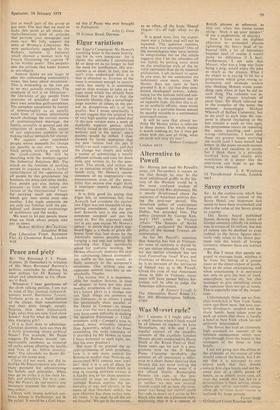Elgar variations
Sir: Elgar's Caractacus. Mr Howes's rambling letter is the more horrify- ing for its very innocence: for it shows the attitudes I complained bf so deep-set as no longer to feel the need for justification. His con- science is so clear, in fact, that he can't even understand what it is that is objected to. Evasion of the issue is common enough in contro- versy, but surely it is something naiver than evasion to take an es- cape route which has already been blocked. For his ploy is that the Acworth libretto (like a revealingly large number of others in the per- iod he disapproves of) is of low quality. But I wrote specifically 'I do not suggest that the original was of very high quality' and added that 'if the new version were a work of markedly superior genius, while wholly suited to the composer's in- tentions and to his music', one's qualms would be stilled. I then showed by lavish quotation that the new version had (to put it mildly) no such superiority, and that the change was simply and solely a matter of substituting a totally different attitude and tone for those held, and written to, by the com- poser. This struck, and strikes, me as an operation strictly in Winston Smith style. Mr Howes's uncon- ciousness of its impropriety—un- consciousness even of the possi- bility that anyone else might think it improper—merely makes things worse.
It is little good his saying that Elgar felt, or sometimes felt, that Acworth had overdone the patriot- ism. Elgar was not incapable of sug- gesting amendment, and the pre- sent Acworth text is the one the composer accepted and put his name to. But the argument could not in any case excuse Mr Howes's action : to prove that a ship's star- board light is a shade of green dif- ferent from that laid down by the Admiralty cannot possibly justify hanging a red one out instead. By admitting that Elgar specifically asked for patriotic wording, Mr Howes effectively destroys the case for substituting liberal cosmopoli- tan waffle to the same music, as flatly contrary to the composer's intentions. One seldom sees an opponent commit hara-kiri so un- abashedly. Thanks.
The notion that it is impermis- sible for Ancient Britons, in time of despair, to have put into their mouths prophecies of their coun- try's future glory is a strange one too. Such things arc common in our literature, as in others. I cited the particularly close parallel of the Druid in Cowper—to whose verse even the most devoted trendy may have some difficulty in making
6, the equation Patriotism = Untal- entedness stick.—Cowper's tone is, indeed, more militantly imperial than Acworth's, which is far from resembling the snide summary of it provided by Mr Howes (a name I have bothered to spell right, un- like his own practice.)
But even if we granted the in- appropriateness of such prophecy, how is it any more natural for Britons to predict that 'Nations un- discovered/Will operate new laws' etc? And if it is out of place for captives just spared from death to sing in rousing patriotic strains, it is hardly less so for them anachro- nistically to urge on their unsym- pathetic Roman captors the im- morality of war and slavery, in the name of that 'freedom' which, the new librettist has them rather lam- ely insist, 'is as vital/As all the air we breathe'. We are in the presence, as so often, of the basic 'liberal' slogan—'it's all righ• when we do it'.
It is good news that the experi- ment was a failure and will not be repeated. The question remains, why was it ever attempted? One of the musicologists who have written to congratulate me on the article suggests that I let the offenders off too lightly by putting more stress on the totalitarian style of the re- write operation than on its essential philistinism. I am inclined to agree. In any case, let me summarise the indictment once more, since Mr Howes does not seem to have grasped it. It is: (a) that they com- mitted ideological rewrite, substi- tuting for the attitude held and sub- scribed to by the composer one of an opposite type; (b) that this is al- so an aesthetic offence, since music written to a patriotic theme cannot be equally suitable to a sentimental cosmopolitanism.
It will be seen that almost no- thing Mr Howes writes is relevant to these points. The whole matter is worth rubbing in; for if they get away with this sort of thing, what on earth will they try next?










































 Previous page
Previous page